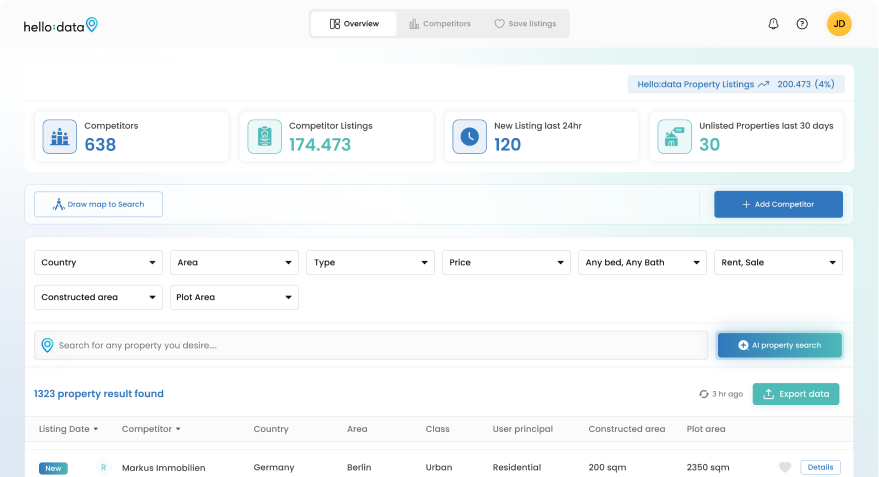Introduction
An Automated Valuation Model (AVM) is a technology-driven approach to property valuation. It uses algorithms and large amounts of data to estimate the value of real estate properties.
AVMs work by analyzing various factors such as home sales price history, local market trends, and property characteristics. This analysis allows them to provide accurate and instant valuations.
Key takeaway: AVMs have transformed how properties are valued in real estate transactions. They offer a quicker and more affordable solution compared to traditional appraisal methods.
Innovations in Proptech, such as AI listing integration, further improve the accuracy and efficiency of AVMs. Additionally, ongoing advancements in AI are not only enhancing property valuation but also revolutionizing market segmentation. This solidifies their importance in modern real estate practices.
Understanding How Automated Valuation Models Work
What is an AVM?
An Automated Valuation Model (AVM) is a computer program that uses mathematical algorithms and statistical models to estimate the value of a property based on various factors. These factors can include recent sales data of comparable properties, property characteristics such as size and location, and market trends. AVMs are designed to provide quick and accurate valuations, making them valuable tools in real estate transactions. However, it’s important to note that they are not a substitute for professional appraisals and should be used alongside other due diligence measures.t estimates the value of a property using algorithms and data analysis. Unlike traditional methods that require human appraisers, AVMs can provide almost instant valuations by looking at a wide range of data.
How AVMs Use Data Analytics and Statistical Modeling
AVMs use data analytics to understand the different factors that affect property values. These factors include:
- Recent sales data
- Property characteristics
- Geographic information
- Market trends
To find patterns and relationships in the data, AVMs use statistical modeling techniques such as regression analysis. By analyzing these variables, AVMs can come up with accurate property valuations.
How Machine Learning Improves AVMs
Machine learning greatly improves the accuracy and reliability of AVMs. This technology:
- Learns continuously from new data, making its predictions better over time.
- Adjusts algorithms based on changes in the market.
- Includes complex datasets, such as social media trends and economic indicators, for a more complete valuation.
Machine learning turns AVMs into flexible tools that can adapt to shifting market conditions, ensuring more precise property valuation.
Understanding how AVMs work explains why they are now essential in the real estate industry, enabling quicker and cheaper property assessments. The rise of Proptech companies, which use technologies like AVMs, has transformed the way we buy and sell properties. For example, platforms like Hellodata are making it easier for users to find their ideal homes by offering extensive market coverage including which markets does Hellodata cover. Whether you need detailed property analysis or want to grasp market trends, tools like Hellodata can offer valuable information.
Types of Automated Valuation Models in Use Today
Automated Valuation Models (AVMs) come in various forms, each tailored to specific needs and use cases. Here’s a breakdown of the prevalent types:
1. Consumer-Ready AVMs
Consumer-ready AVMs are designed for everyday users who seek quick property valuations. These models are accessible via real estate websites and apps, offering instant estimates based on available data. They provide:
- Speed: Immediate results.
- Accessibility: User-friendly interfaces.
- Affordability: Often free or low-cost.
However, they may lack the depth and accuracy required for high-stakes financial decisions.
2. Mass Appraisal Models
Mass appraisal models serve institutions like banks and government agencies. These models analyze vast amounts of data to assess property values across large areas. Key features include:
- Scalability: Ability to handle thousands of properties simultaneously.
- Consistency: Uniform methodologies ensure standardization.
- Efficiency: Reduces the need for individual appraisals.
They excel in broad applications but might miss nuances specific to individual properties.
3. Hybrid Models
Hybrid models combine elements from both consumer-ready and mass appraisal approaches. They leverage advanced analytics and user inputs to refine valuations. Benefits encompass:
- Enhanced Accuracy: Integrates multiple data sources for more precise estimates.
- Flexibility: Adapts to various contexts, from casual inquiries to formal assessments.
- Customization: Tailors outputs based on specific user requirements.
These models strike a balance between accessibility and accuracy, making them versatile tools in the real estate market.
Comparison with Traditional Appraisal Methods
Traditional appraisals involve in-person visits by certified professionals who evaluate a property’s condition, location, and unique attributes. While this method provides detailed insights, it also has limitations:
- Time-Consuming: Requires scheduling and physical inspections.
- Costly: Professional fees add up.
- Subjectivity: Individual appraisers’ opinions can vary.
In contrast, consumer-ready AVMs offer speed and convenience but may lack depth. Mass appraisal models deliver efficiency for large-scale needs but might overlook individual specifics. Hybrid models emerge as a middle ground, providing both speed and nuanced assessments.
Understanding these types helps you choose the right AVM based on your specific needs—be it quick estimates or comprehensive evaluations. Moreover, the integration of AI into these models is paving the way for advancements such as machine learning algorithms that continuously improve accuracy and reliability. As technology evolves, AVMs are becoming increasingly sophisticated, with the potential to revolutionize the real estate industry.
However, it’s important to note that while AVMs offer valuable insights, they should not be considered as a replacement for professional appraisals. In complex cases or high-stakes transactions, it’s advisable to seek the expertise of a certified appraiser. Nonetheless, AVMs remain a powerful tool for initial assessments, market research, and general insights into property values.ch as market segmentation, which is revolutionizing real estate by allowing for more personalized and accurate property valuations.
Advantages and Limitations of Using AVMs for Property Valuation
Benefits of Using AVMs
Automated Valuation Models (AVMs) provide substantial benefits for mortgage lenders and financial institutions:
- Improved Valuation Accuracy: AVMs leverage vast datasets and advanced algorithms to deliver precise property valuations. This reduces human error and bias.
- Cost-Effectiveness: Traditional appraisals can be expensive. AVMs offer a more budget-friendly alternative, saving both time and money.
- Speed of Processing: Instantaneous results from AVMs streamline the decision-making process, expediting transactions.
Lenders can make faster and more informed lending decisions.
Limitations of Using AVMs
Despite their advantages, AVMs also have certain limitations:
Reliance on Data Availability: AVMs heavily rely on accurate and up-to-date data. In areas with limited data availability or high market volatility, the accuracy of AVM valuations may be compromised.
Lack of Human Judgment: AVMs lack the human expertise and judgment that professional appraisers bring to the table. They cannot account for unique property characteristics or assess subjective factors like curb appeal.
Incompatibility with Complex Properties: AVMs are most accurate for standardized, residential properties. For complex or unique properties, such as commercial real estate or luxury homes, a traditional appraisal is still essential.
Legal Compliance: In some jurisdictions, regulations require a certified appraiser’s involvement in property valuation for certain transactions. It’s crucial to ensure compliance with local laws and regulations when using AVMs.
By understanding both the benefits and limitations of AVMs, stakeholders in the real estate industry can effectively leverage this technology for improved decision-making while recognizing its potential shortcomings.ter, more informed decisions, directly impacting their bottom line. Furthermore, the integration of AI in property search, such as finding rental units on MLS and ILS, has further enhanced the efficiency of property valuation.
Limitations of Relying Solely on AVMs
Despite their advantages, AVMs come with limitations:
- Data Quality Issues: The accuracy of an AVM is only as good as the data it uses. Inaccurate or outdated data can lead to flawed valuations.
- Unique Property Characteristics: Algorithms may struggle to account for unique attributes that affect value—such as custom home features or historical significance.
Balancing Accuracy and Efficiency
: While AVMs are efficient in providing quick valuations, they may not always provide the level of accuracy required for more complex or unique properties, such as commercial real estate or luxury homes. In such cases, a traditional appraisal is still essential.
Legal Compliance: In some jurisdictions, regulations require a certified appraiser’s involvement in property valuation for certain transactions. It’s crucial to ensure compliance with local laws and regulations when using AVMs.
By understanding both the benefits and limitations of AVMs, stakeholders in the real estate industry can effectively leverage this technology for improved decision-making while recognizing its potential shortcomings. the use of AVMs with expert human insight ensures a comprehensive property valuation approach. For instance, platforms like Fotocasa and Hellodata are maximizing listings through unique tools that improve property visibility and valuation accuracy. A detailed comparison between these platforms can be found in this article about Maximizing Your Listings: Fotocasa vs Hellodata.
Hello: Here’s Integration with Automated Valuation Models
Hello:Here leverages AI-driven real estate app technology to transform property searching capabilities. By integrating Automated Valuation Models (AVMs), Hello:Here offers users precise, up-to-date valuations for the listings that capture their interest.
Enhancing Property Search Capabilities
- Accurate Valuations: AVMs analyze vast amounts of data to generate accurate property valuations. This ensures users receive reliable information when considering potential investments.
- Up-to-Date Listings: With continuous data updates, Hello:Here guarantees that the property valuations remain current, reflecting the latest market conditions.
- User Experience: By providing immediate access to property values, Hello:Here enhances the user experience, making property searches more efficient and informed.
Impact of Hello Data Property Tracking
Hello Data Property Tracking is integral to the performance of Hello:Here’s AVM-powered features.
- Reliable Real Estate Data: This innovative system aggregates and generates extensive real estate data, surpassing traditional platforms like Casafari and Idealista. For instance, in Mallorca, Hello Data boasts 82k properties compared to Idealista’s 24k.
- Fueling AVM Performance: The rich dataset from Hello Data enhances the accuracy and reliability of AVM outputs within the Hello:Here app.
- Property Matching Efficiency: By utilizing comprehensive data sets, Hello:Here dramatically improves property matching efficiency, connecting users with listings that meet their specific criteria swiftly and accurately.
Understanding ‘As Stabilized Value’ in Real Estate Investments
Understanding ‘As Stabilized Value’ in real estate investments is crucial for making informed decisions. This term refers to the estimated value of a property once it has reached its optimal financial performance.
The Role of AI in Property Search
The integration of AI in property search is revolutionizing how renters and landlords navigate the real estate market. By using advanced technology, AI makes the property search process easier, offering benefits like better-targeted results and streamlined processes.
Hello:Here’s integration of AVMs and robust data tracking systems sets a new standard in the real estate market, offering unmatched value and precision in property searches. Furthermore, understanding complex concepts such as stabilized value and leveraging AI for property search can significantly enhance decision-making processes in real estate investments.
Future Trends Shaping the Landscape of Automated Valuation Models in Real Estate
Proptech innovations are driving the next wave of advancements in Automated Valuation Models (AVMs). Advanced machine learning algorithms, a key aspect of Artificial Intelligence in Real Estate, are at the forefront, enhancing the precision and reliability of property valuations. These algorithms analyze vast datasets, learning from patterns and trends to provide more accurate and dynamic property assessments.
Blockchain technology is another game-changer. It ensures secure data sharing among stakeholders, reducing risks associated with data manipulation and enhancing transparency. Blockchain’s immutable ledger can store transaction histories, ownership records, and other relevant data, making it a vital component for future AVM enhancements.
Predictions on Consumer Expectations
- Demand for Accuracy: As consumers become more tech-savvy, they expect higher accuracy from AVMs. Advanced machine learning models will meet these expectations by constantly refining their algorithms based on new data.
- Transparency: Users increasingly demand transparency in how valuations are derived. Blockchain can provide traceable and verifiable data trails, satisfying this need.
- Integration with Other Technologies: Consumers will look for AVMs integrated with other smart technologies in real estate platforms, providing a seamless property searching experience.
These trends indicate a future where AVMs not only offer unparalleled accuracy but also build trust through transparent and secure processes. As we navigate this evolving landscape, it’s crucial to diversify and conquer our approach towards real estate investments. Understanding concepts like stabilized value will also play a significant role in shaping our investment strategies moving forward.
Conclusion
Balancing technology with human expertise in property valuations remains crucial. While Automated Valuation Models (AVMs) provide speed, cost-effectiveness, and improved accuracy, they can’t capture every nuance. Quantitative data from AVMs is powerful, yet qualitative insights from experienced appraisers add invaluable context.
Key Takeaways:
- AVMs revolutionize real estate valuations
- Speed and cost-effectiveness
- Importance of combining AVM data with human insights
Understanding what an automated valuation model in real estate is and how it functions helps appreciate its role. By integrating both technological advancements and expert judgment, the real estate industry can achieve more accurate and reliable property valuations.










